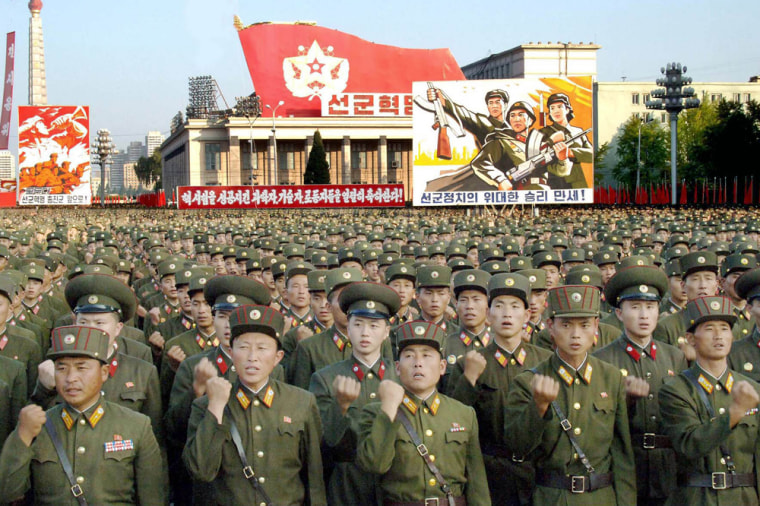North Korea warned South Korea on Wednesday against joining U.S.-led sanctions against Pyongyang and said it would take action after any such move by Seoul.
South Korea’s participation in sanctions would be seen as a serious provocation leading to a “crisis of war” on the Korean peninsula, a North Korean spokesman for the Committee for the Peaceful Reunification of the Fatherland said in a statement carried by the official KCNA news agency.
“South Korea, forced by the United States, has already halted inter-Korea humanitarian projects and is moving to stop cooperation in other areas. The South is even revealing an intention to join U.S.-led military operations aimed at blockade against us," the spokesman was quoted as saying.
“South Korea’s participation in the U.S. racket to put pressure upon the North ... is a serious provocation leading to a crisis of war on the Korean peninsula,” the spokesman reportedly said.
“If South Korea joins the U.S. ploy to pressure us, we will consider it as a declaration of a showdown and take corresponding actions,” the spokesman added.
The North issued a similar warning in September before it conducted a nuclear test earlier this month, prompting the U.N. Security Council to impose financial and arms sanctions on North Korea.
Asia-Pacific powers are trying to pin down the details of U.N. sanctions imposed on North Korea for its Oct. 9 test that Pyongyang blamed on Wednesday on U.S. “double standards” on nuclear issues.
Putin: Don't back North Korea into a corner
In Moscow, Russian President Vladimir Putin said Wednesday that North Korea should not be backed into a corner over its nuclear test.
Referring to the six-party talks, Putin said one of the reasons Pyongyang had resorted to conducting the test was that “not all participants in negotiations were able to find the correct tone...”
“You must never push one of the participants in talks into a corner and place it in a situation from which it can find no way out other than boosting tension,” he said answering questions on live television.
The U.N. Security Council voted on Oct. 14 to impose financial and arms sanctions on North Korea after it staged the nuclear test, but just what those sanctions meant and how they would be implemented was still a matter of debate.
A South Korean task force met on Tuesday and was drawing up an implementation report to complement work in the Security Council this week to draw up lists of banned goods and identify targets of financial sanctions, the foreign ministry said.
Luxury goods were banned by the resolution, as was most trade, travel and financial transactions related to the arms trade. Interdiction — stopping ships or trucks to and from North Korea for inspection — was voluntary and still under discussion.
Tokyo: Onus is on United States
Japan’s Defense Ministry could not confirm media reports that Tokyo was considering deploying several destroyers and patrol aircraft to its western and southern coasts to conduct warning and surveillance activities.
Japan’s defense minister, Fumio Kyuma, indicated it all depended on the United States.
“Japan must keep a close eye on what America decides to do and if it goes ahead must cooperate in various ways or carry out activities of its own,” Kyuma told a news conference.
The United States, which as one of the five recognized nuclear states maintains a massive nuclear arsenal, has promised that it has no nuclear weapons on the Korean peninsula and has also said it has no intention of attacking North Korea.
The U.N. sanctions were aimed at punishing North Korea for its test, which the world body called a “clear threat to international peace and security.” But they were also aimed at bringing the country back to talks that have been stalled since last year.
A senior Japanese government source said foreign ministers from the five countries besides North Korea — the United States, Japan, China, South Korea and Russia — might meet in Hanoi in mid-November on the sidelines of the APEC summit.
China voted in favor of the sanctions but both Beijing and Seoul fear that if they squeeze the impoverished North too tightly it could ruin ties and risk the North’s collapse, sending waves of refugees into China and threatening regional turmoil.
South Korean Foreign Minister Ban Ki-moon was due to visit China on Friday where he would meet President Hu Jintao and China’s envoy to North Korea, Tang Jiaxuan, followed by trips to Russia and France.
